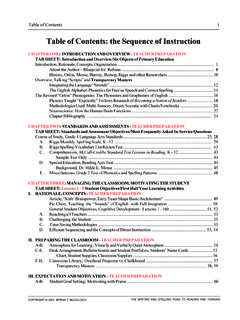Transcription of What Exactly Do Those Letters Stand For Anyway
1 What Exactly Do Those Letters Stand For, Anyway ? MOBILITY Magazine, October 2000 By Alvin "Chip" Wagner III, CRP, IFA Reprinted with permission of the Employee Relocation Council from the October 2000 issue of MOBILITY magazine. Many users of appraisals do not realize the education and training that a real estate appraiser must undergo just to become licensed or certified. Earning a professional designation exhibits a higher level of all designations are not month before Mobility published an article last year written on real estate industry designations by Rob Selleck, CRP, RE/MAX International Relocation Services, Denver, CO, I was asked by a client to explain the many designations associated with the real estate appraisal industry. I spent nearly 30 minutes explaining the various designations that I knew of, but in researching appraiser designations for this article, I found that my knowledge was only the tip of the iceberg.
2 Some designations are very easy to attain. Others take years of education, exams, experience, and comprehensive demonstration reports. State Licensing Federal law requires appraisers to be state-licensed or state-certified for federally-related transactions. These are minimum standards and guidelines that appraisers adhere to. It should be noted that relocation appraisals are not considered a federally-related transaction, therefore, one does not need to be licensed to complete a relocation appraisal. To satisfy the requirements of most relocation management companies, the majority of appraisers practicing relocation appraising most likely are licensed or certified appraisers. A state-licensed real estate appraiser is the minimum licensing that an appraiser must attain. The criteria for licensing are the successful completion of three appraisal courses (totaling 75 classroom hours) with topics in appraisal principles, procedures, and standards of professional appraisal practice and ethics.
3 On completion, the appraiser must pass a comprehensive examination. In some states, this is considered a trainee level. If this is the case, an appraiser with a higher level of licensing must directly supervise the trainee. The criteria for a certified residential appraiser are the same as basic licensing. Also required are additional appraisal courses (totaling 120 hours), proof of experience, and a comprehensive examination. Typically, this is the highest level the appraiser specializing in residential appraisal can achieve. The next level is the certified general appraiser license. It requires additional course work (totaling 165 hours) and experience specializing in income-producing properties such as commercial or industrial. Professional Designations There are dozens of professional organizations that appraisers may choose to join or associate with, all of which differ in membership requirements. Some are local or regional groups and others have a national or international membership.
4 However, they all have something in common: continuing education requirements and admonishment procedures for violating ethics and standards. The credible organizations offer professional designations that are awarded on successful completion of appraisal courses with comprehensive examinations, proof of experience through personal interviews with admissions committees that verify the candidate's experience, and a demonstration appraisal report that could be compared to a master's thesis. Once designated, an appraiser typically must participate in mandatory continuing education programs. These organizations adhere to the Uniform Standards of Professional Appraisal Practice, established by the Appraisal Foundation and adopted by various federal agencies. These standards must be adhered to by all state licensed or certified appraisers. Designated members of many of the professional organizations have fulfilled rigorous educational and experience requirements, obtained a college degree or its equivalent, and must adhere to strict industry standards and a professional code of ethics.
5 There are other appraisal organizations that require limited or no education or practical experience, no re-certification, and no ethical expulsion provisions. One organization's requirements are so loose that an individual's cat was once awarded a designation. Membership in a professional group and a designation earned is not in and of itself evidence of professionalism and quality. There are many highly professional appraisers who choose not to affiliate with a professional association. ERC and the Appraisal Standards Council have approved the organizations featured below. Included are the designations offered. A description of ERC's criteria for acknowledgement of these appraisal designations is in The Directory of Real Estate Appraisers and Real Estate Brokers and Staff. American Society of Appraisers, 703/478-2228 Based in the metropolitan Washington, DC area, the American Society of Appraisers (ASA) has more than 5,500 members.
6 It was formed in 1952 through the merger of the American Society of Technical Appraisers and the Technical Valuation Society founded in 1936 and 1939, respectively. Three designations are recognized, the AM, ASA, and FASA. The ASA is the only major appraisal organization representing all of the disciplines of appraisal specialists, including business valuation, gems and jewelry, machinery and technical specialties, personal property, and real property. Designations are earned based on engagement in the appraisal profession and experience, a college degree or its equivalent, intensive written and oral examinations, submission of acceptable appraisal reports, and two to five years of full-time appraisal experience. Continuing education is required to maintain the designation. AM Accredited Member. To qualify for the AM designation, an individual must have at least two years of full-time equivalent appraisal experience and a college degree or its equivalent.
7 ASA Senior Member. To qualify for the ASA designation, an individual must have a minimum of five years of full-time equivalent appraisal experience and a college degree or its equivalent. FASA Fellow of the Society. To achieve the FASA designation, an Accredited Senior Appraiser must be recognized by ASA's International Board of Governors for outstanding services to the appraisal profession and/or the society. Appraisal Institute, 312/335-4100 The Appraisal Institute is based in Chicago, IL. With more than 15,000 members, it is the nation's largest trade organization for appraisers. There are five designations recognized, the MAI, SRPA, SREA, SRA and RM. Currently, the Appraisal Institute offers only two membership designations, MAI and SRA. The other designations are the result of a 1991 unification of two organizations that merged into the Appraisal Institute. These organizations were the American Institute of Real Estate Appraisers, (founded in 1932) and the Society of Real Estate Appraisers (founded in 1935).
8 Designations are earned based on approved education that includes passing a series of examinations, passing a comprehensive examination, obtaining a college degree or complying with specified alternatives, writing a narrative demonstration report, and maintaining the designation through continuing education. MAI Member Appraisal Institute. The MAI designation is earned by appraisers with experience in the valuation and evaluation of commercial, industrial, residential, and other types of properties, and to Those who advise clients on real estate investment decisions. SRPA Senior Real Property Appraiser. The SRPA designation is held by appraisers who are experienced in the valuation of commercial, industrial, residential, and other types of properties. SREA Senior Real Estate Analyst. The SREA designation is held by appraisers who are experienced in real estate appraising and analysis, and advise clients on real estate investment decisions.
9 To receive the SREA designation, an appraiser already must have received the SRPA or SRA designation. SRA Senior Residential Appraiser. The SRA designation is earned by appraisers who are experienced in the valuation of single-family homes, townhomes, and residential income properties of up to and including four units. RM Residential Member. The RM designation is held by appraisers who are experienced in the valuation of single-family dwellings and two-, three-, and four-unit residential properties. Appraisal Institute of Canada, 204/783-2224 Founded in 1938, the Appraisal Institute of Canada is based in Winnipeg and has 4,500 members across Canada. The two designations offered are the CRA and the AACI. Their requirements include tested education, demonstration appraisal report, appraisal experience, and submission of work product, and oral interview before an admissions committee. CRA Canadian Residential Appraiser. The CRA designation denotes members qualified in the appraisal and valuation of individual, undeveloped residential dwelling sites, and dwellings containing not more than four self-contained family housing units.
10 AACI Accredited Appraiser, Canadian Institute. The AACI designation denotes fully accredited membership in the Institute and may be used by the holder for the appraisal of a full range of real property. National Association of Independent Fee Appraisers, 314/781-6688 The National Association of Independent Fee Appraisers, founded in 1961, is based in St. Louis, MO, and has more than 3,800 members. Four designations are recognized, the IFA, IFAA, IFAC, and IFAS. The designations are earned by passing four to six courses, passing the comprehensive member examination (waived if state certification is passed), meeting experience requirements of at least two years, completing at least two years of college or its equivalent, and submitting demonstration appraisal reports. The designations are maintained through continuing education. IFA Member. The IFA designation is conferred to the residential appraisal specialist. IFAA Appraiser-Agricultural.








